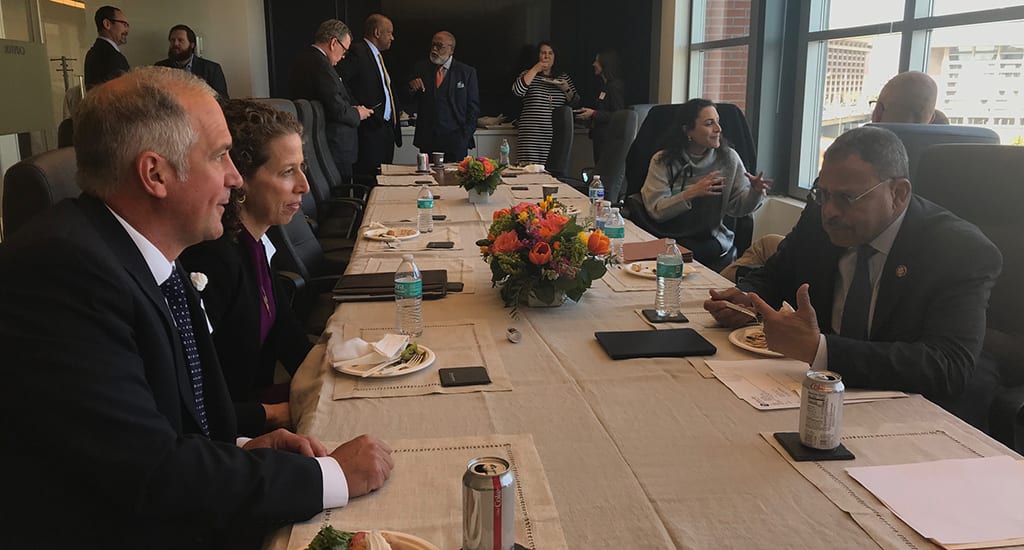
SAF President Bill LaFever, PFCI, and SAF CEO Kate Penn discuss issues with Rep. Sanford Bishop (D-Georgia), chairman of the House Appropriations Subcommittee on Agriculture on March 20, 2019.
Editor’s note: Advocating for the floral industry’s needs on Capitol Hill is a key priority for the Society of American Florists. What issues are most likely to impact you and your business – and how? What is SAF doing about it? In this ongoing series, SAF senior lobbyist Joe Bischoff breaks down one issue at a time and outlines SAF’s advocacy work on it. This week, Bischoff talks about the role the SAFPAC plays in SAF’s advocacy efforts.
Q: Mixing money and politics on the surface seems a bit unseemly. How do PACS get their money?
A: PACs raise money for the purpose of supporting candidates that reflect the positions of the organization that sponsors the PAC — just like SAFPAC supports candidates who support positions important to the Society of American Florists. PACs raise money from individual contributions from the organization’s membership. And that’s an important distinction — only individual citizens can contribute to a PAC. Companies are not permitted to make contributions. The rules also preclude individuals from donating more than $5,000 per year to a PAC, and do not allow contributions from non-U.S. citizens.
Q: Seems like there’s a lot of regulations around PACs — and stories about illegal contributions to legislators. What’s that all about?
A: There are costs associated with our election system. Candidates have to spend money to get their name out there and win campaigns. Our system needs a legal path for money to be raised that is strictly regulated — if the rules are skirted, that’s where the problem comes in. Under the current structure, who is contributing to a PAC, who the PAC is contributing to — all of that information is public knowledge, and it doesn’t happen behind closed doors.
Typically, stories of money illegality have to do with individual members of Congress receiving gifts (often travel), which they are not permitted under law to receive. Those individuals are clearly outside the law and not part of the legal donation process associated with PACs.
Q: How does SAFPAC determine which candidates or members of Congress to support?
A: SAF develops its contribution strategy based on the business of floriculture. We typically work with — and make SAFPAC contributions to — members who support floral production, support reduced barriers to trade (both international and interstate) and support small business issues. Our decisions are based on individual members and their positions on issues that affect the floriculture industry rather than party affiliation. That said, we do always look to strike a balance in who we support, as SAFPAC is bipartisan. We find the right formula by giving favor in part to which party has control of the House and Senate, but we never want to lean too far in one direction. The political pendulum always swings back, and SAF needs to have good relationships on both sides of the aisle.
Q: Do members of Congress actually know the people who contribute to them?
A: While members of Congress would certainly gladly just accept a check, when SAFPAC contributes to a member, the Congressional member’s campaign usually provides an opportunity for social engagement. SAF’s lobbying team and CEO Kate Penn then have the chance to get to know members of Congress and their staffs better. It’s an opportunity for us to talk more about the industry and for the member of Congress to share some of the opportunities and challenges they see happening on the Hill. We use those official events to share our position on the issues important to floriculture.
Meeting with members and their staffs on the Hill are just that—meetings. But if you do those Hill meetings coupled with PAC contributions and PAC events, it’s about developing the overall relationship with a Congressional office.
Q: So, once you contribute to a candidate, is that it, or do you have to continue to contribute each year?
A: There is no requirement. We try to develop long-term relationships with members and their staffs — hopefully, for as long as they are in Congress. And part of maintaining that relationship is SAFPAC contributions. That said, every year and every Congressional cycle offers an opportunity to reassess if they are supportive of our issues — and if they warrant SAF’s continued SAFPAC support.
Q: What role does SAFPAC play in our overall advocacy strategy?
A: In recent years, SAF has made it a priority to increase floriculture research funding, for example. In order to accomplish that goal, you need to have relationships with the Agricultural Appropriations committees in the House and Senate. And for issues related to trade, taxes and GSP, the Ways & Means committee has jurisdiction. We have focused our SAFPAC contributions on members who serve on these committees, as well as the Agriculture Committee in the House and Senate where SAF has a long history of relationships. Why? It has helped strengthen our relationships with these members and has given us more opportunities to highlight the societal and economic benefits of flowers and SAF’s policy positions.
Q: How can SAF members further engage with SAFPAC?
A: The first step is signing a prior approval form online. This permission is required by law. Signing it does not obligate you to donate to SAFPAC — it merely lets SAF communicate with you about what SAFPAC is doing and alert you to future SAFPAC events.
Katie Butler is the senior vice president of the Society of American Florists.

